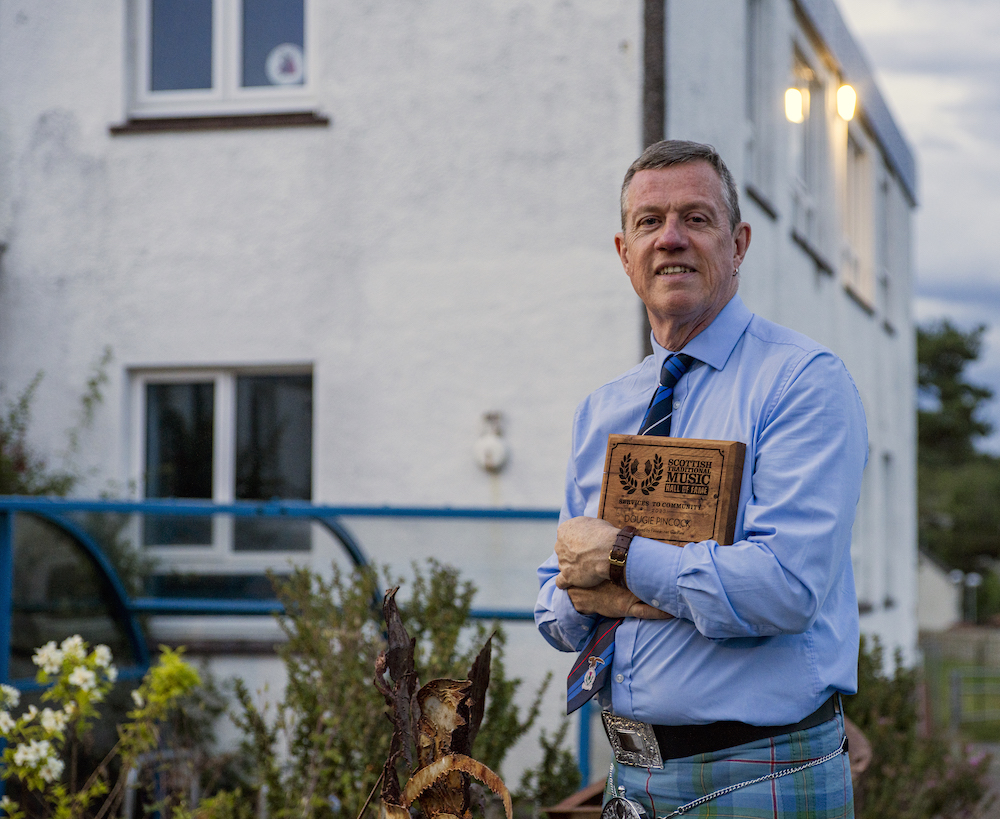
Dougie Pincock, a renowned figure in Scottish traditional music, was born and raised in Govan, Glasgow, before moving to Barrhead in East Renfrewshire at a young age. His musical journey began during his primary school days when he started learning the bagpipes. Influenced by the headmaster, John MacFadyen, and instructor John Garroway, Dougie’s passion for piping grew. He continued his musical education at the College of Piping, studying under notable instructors like Angus J. MacLellan and Ronald Lawrie.
At the age of 13, Dougie joined the Neilston And District Pipe Band, where he encountered his greatest influence, Pipe Major Iain MacDonald. Iain introduced Dougie to a wide range of music, particularly the instrumental revival happening in Scotland and Ireland. This exposure to groups like The Chieftains, Planxty, The Bothy Band, and The Tannahill Weavers played a pivotal role in shaping Dougie’s musical career. Duncan Johnstone, another important mentor, further nurtured his talents.
While growing up, Dougie had a diverse taste in music. Alongside traditional music, he listened to The Beatles, progressive rock bands like The Nice and Yes, and had friends who shared different music preferences. Music was a constant presence in his household, with his father playing trumpet and side drum, and his mother’s brother playing the fiddle and moothie. Anybody who came to their house for a party had to have a party piece ready, and in the West of Scotland in the 1960s and 70s, that could be anything!
Dougie Pincock had already established himself as a skilled musician, having showcased his talent while playing with the acclaimed Glasgow band ‘Kentigern’. However, when the opportunity arose to become a full-time member of the Battlefield Band, Dougie eagerly seized it. The band, renowned for their boundless innovation and creativity, provided Dougie with an environment where he could fully immerse himself in composing tunes, writing songs, and meticulously refining arrangements. Although already proficient in playing the highland pipes, whistle, and flute, Dougie soon found himself expanding his repertoire. He took on harmony vocals and skilfully incorporated the saxophone and bodhran into his performances, and even ventured into programming the controversial drum machine—an instrument that sparked much debate within the music community.
In 2000, Dougie was appointed Director of Sgoil Chiùil Na Gàidhealtachd and for the next 23 years he brought through countless young musicians into the traditional music scene. Former pupil and musician Mari Mackinnon said talking about Dougie’s legacy “It was all just so special… From the tours, to the performances, the carry-on’s and the capers, our debut at Celtic Connections in 2010, to making friendships for life, to losing the microphones on tour, the tunes, the music weekends, the stressful ‘big sets’, the encouragement to do better, the safety to make mistakes and learn, the life long skill of wrapping an XLR cable meticulously, the success, the failures, the tears, the smiles, the buzz of being part of something more special than we ever realised at the time… Dougie worked so hard to give us all of that – It’s shaped us to be who we are, it’s part of our identity and many of us wouldn’t be living the lives we do without those experiences!.”
Reflecting on the evolution of the music scene since his early involvement, Dougie acknowledges being fortunate to witness significant changes. “I’ve been very lucky to be in the right place at the right time throughout my life as far as music is concerned. When I started going to sessions in Glasgow, there were two teenagers – me and Tony McManus. Nowadays that’s unthinkable, but it’s been the single biggest change in my lifetime.”
The music itself has been Dougie’s lifeblood, and he feels grateful to have made a career out of his passion. The opportunity to learn from gifted individuals worldwide and share that knowledge with others has been a cherished aspect of his journey. Moreover, Dougie emphasises that the music community, not just in Scotland, comprises some of the finest individuals. Music has a transformative power, bringing out the best in people and offering guidance on living a fulfilling life.
Looking to the future, Dougie expresses his intention to continue working and exploring his musical endeavours. With missed playing time to catch up on, a collection of compositions, tunes, and songs to delve into, and various musical instruments to master, there is no shortage of projects awaiting his attention. He also looks forward to spending time with his grandchildren, creating precious memories.
When asked if he had anything else to say he said “Yes. Thank you. The problem is that I have so many people to say it to that I’ll probably never catch up with them all. So if you’re reading this and you’ve given me something, taught me something, or shared something with me, thank you. If you’ve listened to me playing and haven’t left the room, thank you. If you’ve listened to me talking and haven’t left the room, huge thank you! And if any of these things happen in the future, then thank you in advance.
In the words of one of my greatest heroes, “Love, Light and Peace”.